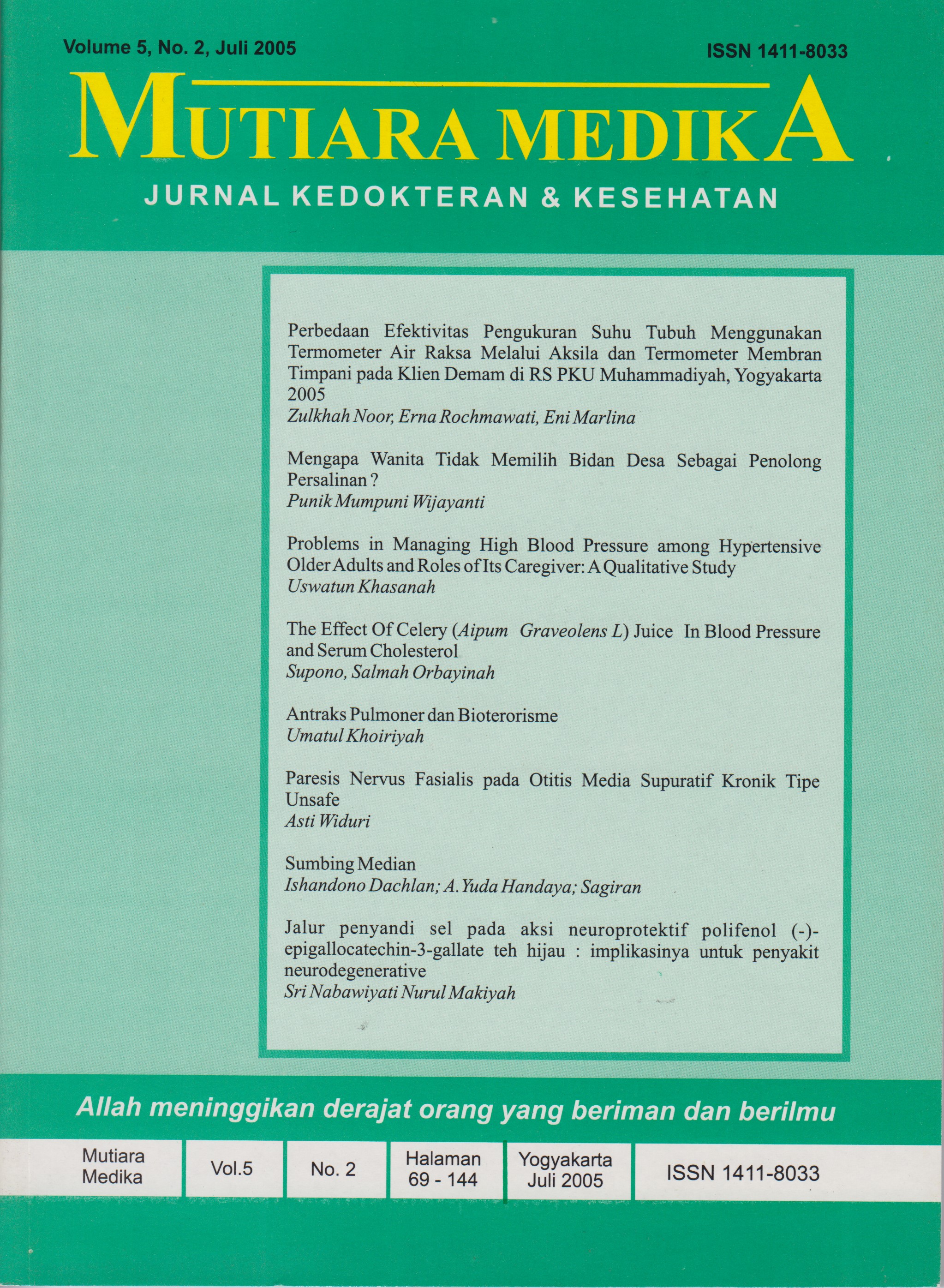Mengapa Wanita Tidak Memilih Bidan Desa Sebagai Penolong Persalinan ?
DOI:
https://doi.org/10.18196/mmjkk.v5i2.1873Keywords:
bidan desa, dukun bayi, persalinan, pola pelayanan, komunikasi, village midwives, traditional midvives, type of delivery, communicationAbstract
The rate of mortality and morbidity in pregnancy and delivery remains a big problem for developing country as Indonesia. One of the contributing factors is that a lot of deliveries are assisted by less-education traditional midwives delivery. Although there are adequate village midwives; rural people favor traditional midwives delivery.This study was aimed at identifying why people like less-trained traditional midwives more than village midvives.
This is qualitatif study with indepth interview and Focus Group Discusion (FGD). The targets of FGD were (I) mother whose delivery were assisted by less-trained traditional midwives delivery; and (2) mother whose delivery were assisted by well-trained midwives (village midwives). The study employed 19 post-partum mothers from Gebang and Pituruh Purworejo Jawa Tengah.
The result of the study suggested that traditional midwivery service emphasizing on familiarity and close relationship are more interesting than formal well-trained midwivery service by village midwives. Therefore; village midwives have to possess a good interpersonal skill in order to provide a successful and safe delivery.
Angka kematian dan kesakitan pada kehamilan dan persalinan masih merupakan masalah yang besar di negara berkembang; seperti di Indonesia. Salah satu sebab antara lain masih banyak persalinan yang ditolong oleh dukun bayi yang kurang terdidik. Walaupun telah cukup tersedia bidan desa tetapi masyarakat setempat masih lebih menyukai dukun bayi.
Tujuan penelitian ini adalah untuk mencari faktor penyebab mengapa masyarakat setempat lebih banyak yang memilih dukun bayi untuk menolong persalinan dibanding dengan bidan desa.
Metode penelitian ini menggunakan metode kualitatif dengan teknik wawancara mendalam (indepth interview) dan FGD {Focus Group Discussion). Sasaran FGD adalah (l)Ibu pasca bersalin dengan dukun (2)Ibu pasca bersalin dengan bidan desa; dan sasaran indepth interview adalah (l)Ibu bersalin dengan dukun; (2) Ibu bersalin dengan bidan desa. Subyek penelitian terdiri dari 19 ibu pasca bersalin yang berasal dari kecamatan Gebang dan Pituruh Kabupaten Purworejo
Hasil penelitian menunjukkan bahwa pola pelayanan persalinan oleh dukun bayi yang lebih menitikberatkan pada suasana keakraban dan kekeluargaan lebih menarik dibandingkan dengan pola pelayanan persalinan oleh bidan desa yang terkesan formal. Dengan demikian statu keahlian komunikasi dengan masyarakat baik massa maupun interpersonal harus dimiliki oleh bidan desa untuk lebih mensukseskan pertolongan persalinan yang aman.
References
Departemen Kesehatan RI, (2003) Indonesia sehat 2010, Jakarta
WHO-SEARO. Regional Health Report 1988. Focus on Women, New Delhi: WHO-SEARO, 1988
Gani, Ascobat (1994), Kumpulan Makalah Simposium Evaluasi kebijakan pengadaan dan pendayagunaan bidan di desa, Badan Penelitian dan Pengembangan Kesehatan, Jakarta.
Prabandari, YS., Fatwa dan Wijayanti PM, 1999, Pemberdayaan keluarga dalam upaya peningkatan deteksi dini: kehamilan resiko tinggi dan tanda bahaya kehamilan (suatu pendekatan “promosi kesehatan” sebagai alternatif operasional “model pengembangan pelayanan kesehatan ibu hamil”), laporan penelitian Risbinkes, Depkes RI, Jakarta
Prabowo, AH, (2003), Rendahnya Persalinan Oleh Tenaga Kesehatan, www. Tempo.co id
, 2002, Laporan Akhir Surkenas Workshop on Evidence for Decision Making, Badan Penenitian dan Pengembangan Kesehatan Depkes RI dan WHO, Indonesia
Wijayanti, PM (1999), Determinan pemilihan penolong dan tempat pertolongan persalinan di kecamatan Gebang dan Pituruh Kabupaten Purworejo, Thesis, UGM, Yogyakarta
Notoatmodjo, S., 2004. Pengantar Pendidikan Kesehatan dan Ilmu Perilaku Kesehatan, Andi Offset, Yogyakarta.
Hakimi, Mohammad (1999), Determinan Pemilihan Penolong dan Tempat Pertolongan Persalinan di Kabupaten Purworejo, Pusat Penelitian UGM, Yogyakarta
Downloads
Issue
Section
License
Copyright
Authors retain copyright and grant Mutiara Medika: Jurnal Kedokteran dan Kesehatan (MMJKK) the right of first publication with the work simultaneously licensed under an Attribution 4.0 International (CC BY 4.0) that allows others to remix, adapt and build upon the work with an acknowledgment of the work's authorship and of the initial publication in Mutiara Medika: Jurnal Kedokteran dan Kesehatan (MMJKK).
Authors are permitted to copy and redistribute the journal's published version of the work (e.g., post it to an institutional repository or publish it in a book), with an acknowledgment of its initial publication in Mutiara Medika: Jurnal Kedokteran dan Kesehatan (MMJKK).
License
Articles published in the Mutiara Medika: Jurnal Kedokteran dan Kesehatan (MMJKK) are licensed under an Attribution 4.0 International (CC BY 4.0) license. You are free to:
- Share — copy and redistribute the material in any medium or format.
- Adapt — remix, transform, and build upon the material for any purpose, even commercially.
This license is acceptable for Free Cultural Works. The licensor cannot revoke these freedoms as long as you follow the license terms. Under the following terms:
Attribution — You must give appropriate credit, provide a link to the license, and indicate if changes were made. You may do so in any reasonable manner, but not in any way that suggests the licensor endorses you or your use.
- No additional restrictions — You may not apply legal terms or technological measures that legally restrict others from doing anything the license permits.






